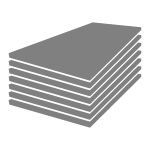Alloy 400 / N04400 / W.Nr. 2.4360 & 2.4361
Description
Alloy 400 is a single phase, solid-solution nickel-copper alloy that offers superior resistance to many corrosive environments over temperatures ranging from sub-zero to 800°F. This alloy is only hardenable through cold working, rather than heat treatment. The Curie Temperature of this alloy lies in the ambient temperature range and is affected by variations in the alloy’s chemical composition. Caution is advised in applications where strong nonmagnetic characteristics are desired. The ratio of copper to nickel in alloy 400 is almost identical to that found in the ore the metal is derived from. This alloy was first patented over 100 years ago, and it continues to be one of the most commonly used corrosion resistant alloys commercially produced.
Industries and Applications
Alloy 400 has been widely used in a variety of industries, and has been particularly useful in the marine industry and chemical processing industry. Typical applications include pumps and valves, propeller shafts, marine fixtures and fasteners, electronic components, springs, chemical processing equipment, fresh and salt water tanks, process vessels and piping, boiler feedwater heaters and other heat exchangers.
Resistance to Corrosion
Alloy 400 exhibits resistance to corrosion by many reducing media. It is one of the few alloys that can be used in contact with fluorine, hydrofluoric acid, hydrogen fluoride or their derivatives. Exceptional resistance has been proven in hydrofluoric acid in all concentrations up to the boiling point. Alloy 400 is also resistant to many forms of sulfuric and hydrochloric acids under reducing conditions. Corrosion resistance behavior in seawater is excellent.
Fabrication and Heat Treatment
Typical shaping, forming, machining and joining operations can be used when fabricating alloy 400. Hot working operations should be performed between 1200°F and 2150°F. For heavy reductions a temperature between 1700°F and 2150°F should be used. Cold working should be performed on annealed material. Heat treatments available to alloy 400 are stress equalizing, stress relieving and annealing depending on the mechanical properties desired. Stress equalizing is performed at a temperature of 575°F for a period of 3 hours followed by a rapid quench. This causes an increase in yield strength with no effects on other properties. Stress relieving is achieved at a temperature between 1000°F and 1050°F for a period of 1 to 2 hours followed by slow cooling. This will reduce stresses without producing a recrystallized grain structure and is recommended to obtain minimum distortion after metal removal. Annealing will completely soften work hardened material and is performed by holding at temperatures between 1600°F and 1800°F for 2 to 10 minutes followed by rapid quench.
Common Trade Names
MONEL® alloy 400
MONEL® is a registered trademark of the Special Metals Corporation group of companies.











